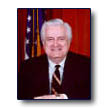 |
|
|
 |
 |
 |
 |
| FULL STATEMENT : |
| Hyde, Henry (R-IL), Former Chairman |
 |
Name: Hyde, Henry (R-IL)
Title: Former Chairman
Company/Organization/University: House International Committee
Profile >
|
|
Public Diplomacy Bill Authorizes Islamic Exchanges
IIE is posting this announcement on behalf of the Alliance for International Educational and Cultural Exchange:
Public Diplomacy Bill Authorizes Islamic Exchanges
March 14, 2002 - The chairman of the House International Relations Committee today introduced a bill aimed at strengthening the State Department's conduct of public diplomacy. The bill also authorizes new exchange programs with the Islamic world, funded at $70 million over two years.
The bill, entitled "The Freedom Promotion Act of 2002", is cosponsored by Rep. Henry Hyde (R-IL), Former chairman of the committee. According to a news release, the committee intends to report the bill by March 20. The committee's quick endorsement would make the bill eligible for early consideration by the full House.
According to Congressional sources, the committee's senior Democrat, Rep. Tom Lantos (D-CA), had intended to cosponsor the legislation with Hyde, but withdrew his name at the last minute over concerns about the bill's broadcasting provisions.
"Public diplomacy - which consists of systematic efforts to communicate not with foreign governments but with the people themselves - has a central role to play in the task of making the world safer for the just interests of the United States, its citizens, and its allies," said Hyde.
"If we are to be successful in our broader foreign policy goals, America's effort to engage the peoples of the world must assume a more prominent place in the planning and execution of our foreign policy," Hyde added. "The task of countering misinformation and propaganda regarding the United States is a never-ending one, but we must go about this task more aggressively and more systematically, rather than simply reacting to crises as they occur."
Exchange Programs Specified
The bill authorizes new exchange programs for the Islamic world:
· "Youth ambassadors", a summer youth exchange program of 3-4 weeks in length for individuals from countries with a predominantly Muslim population.
· A journalism initiative to work with foreign journalists to enhance international standards of quality and objectivity. This program will be established and operated in cooperation with private sector sponsors, including universities and exchange programs.
· A pilot program in English language teaching, that will send Americans to middle schools in the Muslim world to provide English language instruction.
· A Sister Cities initiative to expand the number of US-sister city partnerships in countries with a predominantly Muslim population. (Currently there are 42 such partnerships). These partnerships are aimed at community level development and volunteer action and include non-federal support.
· A library initiative, designed as a demonstration program to examine the most effective way to augment resources in local public library systems overseas in order to "familiarize participants with American values and society, particularly the importance of freedom and democracy."
In addition to these new programs, the bill directs the State Department to increase the numbers of American Fulbright grantees in all categories going to predominantly Muslim countries, and to place special emphasis on students and scholars focusing on American studies. The bill also would have the department substantially increase the number of Humphrey fellows from the Islamic world. The bill also requires the creation of a database for exchange program alumni.
Structural Issues Addressed
Responding to concerns over the State Department's ability to conduct public diplomacy, the bill's drafters propose several significant structural changes at State. Under the bill, the Under Secretary for Public Diplomacy and Public Affairs would gain enhanced authority over the department's public diplomacy programs and personnel, and a stronger role in coordinating public diplomacy activities. The bill also would create a firewall around the entire public diplomacy budget, giving international information programs budgetary protection similar to that already accorded to exchanges. In addition, the bill mandates: that State produce an annual strategic plan for public diplomacy; that it make public diplomacy a key element in recruiting new officers, in the Foreign Service examination, and in performance review; and that U.S. ambassadors be given specialized public diplomacy training.
The bill creates an International Broadcasting Agency, to be headed by a presidential appointee, and mandates a biennial comprehensive review of public diplomacy, to be conducted by the General Accounting Office and the Advisory Commission on Public Diplomacy.
Hyde, Henry***All excerpts taken from the above statement by Rep. Henry Hyde (R-IL), Former chairman of the House International Committee.
|
|
|
 |
|
|
 |